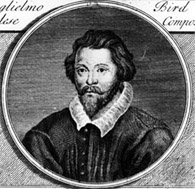William Byrd was known as "the father of
English musick": he was the last great English composer of
Catholic church music, as well as the first of the Elizabethan
"golden" age of secular music. Under the Protestant reign of
Elizabeth I, many Catholics feared that they would be persecuted
for their faith; Byrd's devout Catholic beliefs, however, seem to
have been largely tolerated by the Queen, and this despite his
close association with many Catholic recusants (those
who refused to submit to Church of
England dictates).
Little is known about Byrd's early years.
He may have been a pupil of Thomas Tallis in London; the first
authenticated records reveal him as organist and choirmaster at
Lincoln Cathedral in 1563. In 1570 he was invited to join the
Chapel Royal as a singer, although he did not actually leave
Lincoln to take up his post until two years later. Even in London
he continued to receive partial pay from the cathedral in return
for further compositions — of Anglican church music. In 1572 he
was appointed organist of the Chapel Royal, a position he
initially shared with Thomas Tallis, and for the next 20 years or
so Byrd remained in service at the court. In 1575 he and Tallis
were granted a royal monopoly on the printing and selling of
music.
During a period of general persecution of
Catholics in the late 1570s, Byrd moved out of London with his
family, and settled in Harlington, Middlesex. His wife, Juliana,
was listed for refusing to attend Church of England services, which at that
time was compulsory. In 1581 several Jesuits were executed. Byrd's
house was searched and he was fined for his beliefs, but he
nonetheless remained free. In the 1540s. after Juliana's death and
his second marriage, he moved to Essex, where he lived for the
rest of his life.
Byrd's music was as often dedicated to
prominent Catholics as to Anglican patrons. His music encompassed
both instrumental and vocal works, secular and sacred, Anglican
and Catholic. He usually wrote his secular vocal music for solo
voice accompanied by viol consort (ensemble), rather than the lute
preferred by his contemporaries. His greatest instrumental music
was for the viol, and he also wrote about 150 pieces - often dance
movements - for keyboards.
Byrd wrote many Anglican church music
settings, including anthems, but his most sublime music was
composed to Latin texts (for the Catholic Church), such as the
motet for four voices, Ave verum corpus. His three Masses
for three, four, and five voices, use the typical English
technique of imitation — melodic phrases repeated by different
voices at various points in a composition. This technique allowed
a great deal of emotion to be expressed, and in the case of Byrd's
Masses — written for the private use of his fellow Catholics, and
relatively compressed — the emotion was that of a deeply felt
religious belief, a belief under attack: the music is powerful and
austere, yet essentially positive.
|

